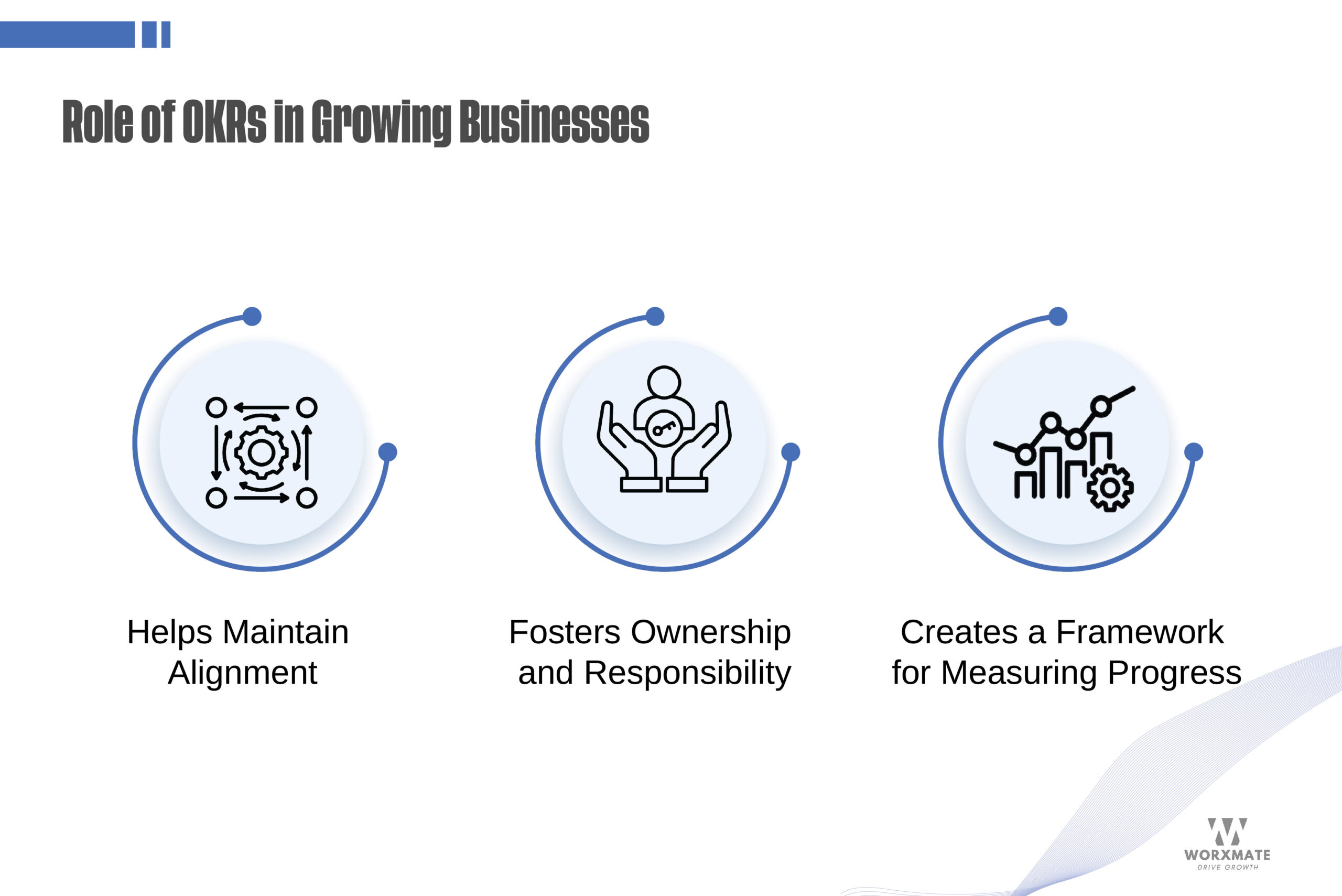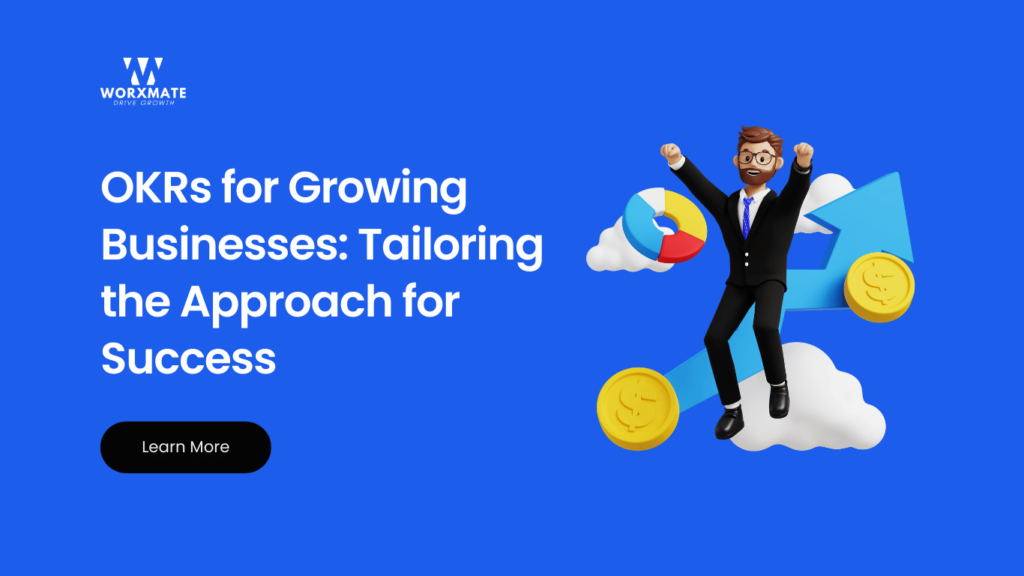Growing businesses constantly strive to set and achieve ambitious goals that drive growth and success. That’s where OKRs (Objectives and Key Results) come into play. OKRs are all about clarity and direction. Objectives are the big-picture goals you want to achieve, while Key Results are the measurable outcomes that indicate progress toward those goals. Unlike traditional goal-setting methods, OKRs emphasize transparency, focus, and agility.
They provide a framework for teams to align their efforts and track their impact in real-time. 60% of individuals working with OKRs clearly understood their organization’s strategic direction, compared to approximately 37% in companies without OKRs.

» The Role of OKRs in Growing Businesses
As businesses scale, they encounter a myriad of new challenges and opportunities inherent to growth. From expanding market reach to increasing operational complexity, navigating these waters requires a strategic approach. This is where OKRs emerge as a beacon of guidance and structure, empowering growing businesses to chart their course.
One of the main benefits of OKRs in growing businesses is their ability to maintain team alignment on tasks. As organizations expand, it becomes increasingly challenging to ensure that everyone is working towards the same overarching goals.
OKRs provide a clear framework for defining and communicating these objectives across the entire organization. Whether it’s entering new markets, launching innovative products, or improving operational efficiency, OKRs keep everyone focused on the goals that matter most.
LinkedIn is a great example where OKRs have been instrumental in connecting employees to the company’s mission, emphasizing the importance of personal and team OKRs aligned with organizational objectives
OKRs foster a culture of accountability and transparency within the organization. In a growing business, it’s easy for individuals and teams to become siloed in their efforts, losing sight of how their work contributes to the broader mission.
OKRs solve this by creating visibility on the impact of each individual’s contributions. By aligning their objectives and key results with those of the organization, employees gain a clear understanding of how their efforts fit into the bigger picture. This not only fosters a sense of ownership and responsibility but also cultivates a shared sense of purpose and drive across the organization.
As businesses grow, they must remain agile and responsive to the evolving market. OKRs serve as a compass, guiding decision-making and resource allocation in alignment with strategic objectives. They allow organizations to adapt quickly to changing circumstances, reallocating resources and adjusting priorities as needed to stay on course towards their goals.
OKRs create a framework for measuring progress and driving results. It’s essential to track performance against key metrics to ensure that efforts are bringing in tangible outcomes. OKRs provide a clear definition of success through specific, measurable key results, enabling teams to measure their progress and course-correct if necessary. Nearly 83% of companies working with OKRs believe they have benefited from implementing the framework.
» Tailoring OKRs for Success
One size doesn’t fit all when it comes to OKRs. To be effective, OKRs need to be tailored to fit the unique needs and circumstances of each business. This starts with a deep understanding of where the business is today and where it wants to go tomorrow.
From there, objectives should be ambitious yet achievable, inspiring teams to reach new heights. Key results should be specific, measurable, and time-bound, providing clear benchmarks for success. By customizing OKRs in this way, businesses can unlock their full potential and drive business growth.
» Implementation Strategies
Implementing OKRs is more than just setting goals; it’s a cultural shift. It requires buy-in from leadership, active participation from teams, and ongoing support from all levels of the organization. To set the stage for success, businesses should engage teams in the OKR process from the start.
This means providing training and resources to help them understand the purpose and principles of OKRs. Regular check-ins and progress reviews are also essential for keeping teams on track and addressing any roadblocks that arise.
» Overcoming Challenges
Implementing OKRs comes with its own set of challenges. Resistance to change is common, especially in organizations with deeply ingrained processes and routines.
To overcome this, businesses need to communicate the ‘why’ behind OKRs and show how they will benefit both the individual and the organization as a whole. Shifting priorities and unforeseen obstacles can also delay OKR implementation. That’s why it’s important to stay agile and adaptable, adjusting OKRs as needed to reflect changing circumstances.
» Continuous Improvement and Evolution
OKRs are not a set-it-and-forget-it tool. They require constant input and refinement to remain effective. It’s important to build feedback loops into the OKR process, gathering input from teams and stakeholders to identify areas for improvement. This feedback should shape future iterations of OKRs, ensuring they stay relevant and impactful over time. With continuous improvement and evolution, businesses can unlock the full potential of OKRs and drive sustainable growth for years to come.
» Conclusion
OKRs provide a powerful framework for achieving this, guiding growing businesses through the ups and downs of the market landscape. By tailoring OKRs to fit their unique needs and leveraging the best OKR software, businesses can drive meaningful growth, foster a culture of accountability, and unlock their full potential. So what are you waiting for? It’s time to harness the power of OKRs and take your business to new heights.




